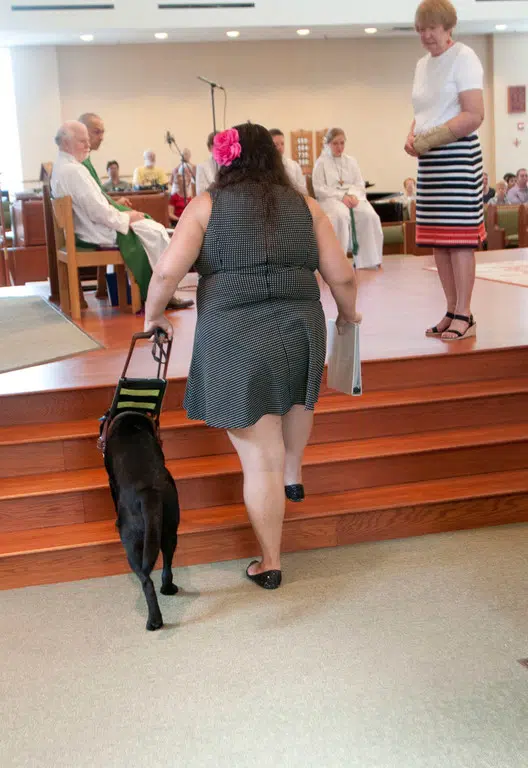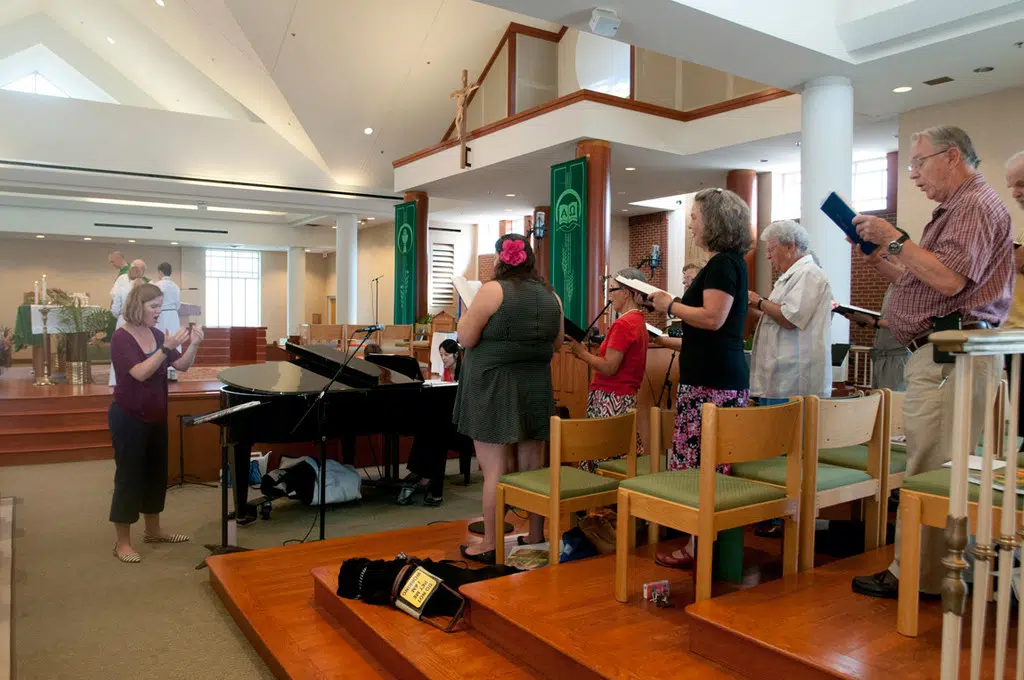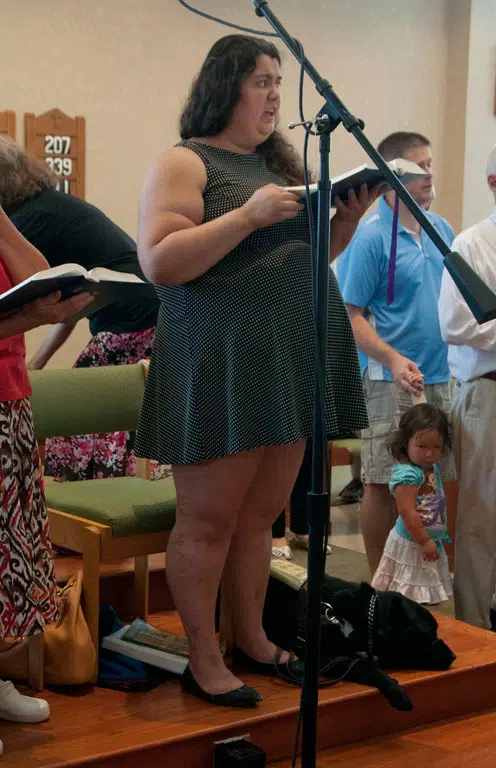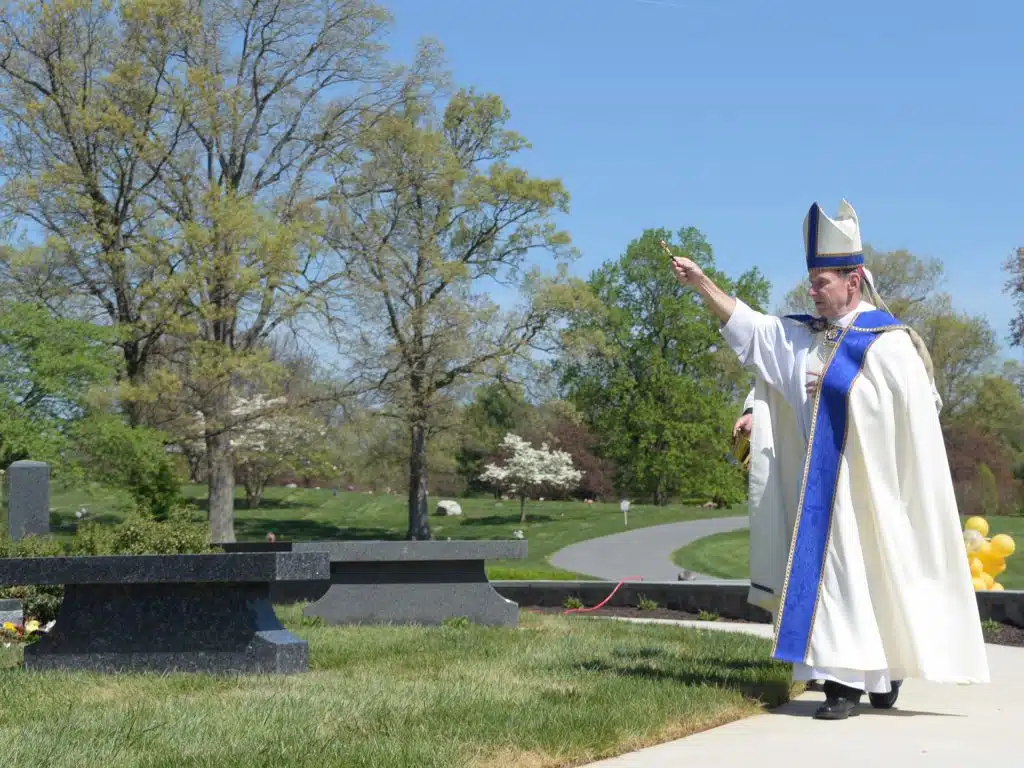As a lector read from Ecclesiastes, a dog lay in a patch of
sunshine next to a pew at St. Ann Church in Arlington. The
black Lab readjusted a paw and closed her eyes, appearing to
settle into a meditation on the first reading.
Moments later, after hearing a gentle command, Mileigh
(pronounced “Miley”) led Molly Eschelbach up the altar steps
so the young woman could cantor during the Sunday morning
Mass.
Mileigh is a guide dog, and like most service animals, she’s
by her owner’s side at all times. This dog, however, not only
goes to grocery stores, movie theaters, malls and
restaurants. She also regularly attends Mass and choir
practice with her musically gifted owner.
Missionhurst Father Ramel (“Mel”) O. Portula, pastor of St.
Ann, said Mileigh’s presence at church benefits more than
just Eschelbach. “She raises awareness of the needs of
handicapped people,” he said. And with all her hours logged
in church, Mileigh “is in a way Catholic, too,” laughed
Father Mel.
Eschelbach is a convert to Catholicism who made her musical
debut in a Lutheran church choir at just 3 years old. Before
moving to Northern Virginia last year, she sang with a
semiprofessional choir in her home state of Michigan.
Mileigh’s musical career, though, “sadly had to be cut
short,” said Eschelbach in an interview after Mass. Attending
her first-ever rehearsal, the Lab – “a tenor” – contributed
her own “singing,” Eschelbach recalled. The musical
enthusiasm was curbed, and the Lab now can snooze through any
volume of music, “even French horns,” said Eschelbach.
At 13 years old, Eschelbach was diagnosed with retinitis
pigmentosa, an inherited, degenerative eye disease. Although
she still has some sight, the 30-year-old is legally blind –
with tunnel vision, partial color blindness and limited depth
perception. She eventually will lose nearly all her sight.
Eschelbach said she coped with her vision loss through high
school and college, but four years ago she “knew the time had
come to receive more help.”
She taught herself how to use a cane, yet “with a cane
there’s a lot more stigma, a big red flag that someone is
different,” she said. A “dog person,” Eschelbach decided to
apply for a guide dog from Leader Dogs for the Blind in
Rochester Hills, Mich. Through the organization, puppy
raisers give the dogs love and teach them basic commands,
such as sit, stay and heel. After puppyhood, the dogs receive
advanced training before being matched with a legally blind
individual. The matchmaking process takes into account a
person’s walking speed, lifestyle and personality. Once
matched, the new owner and the dog undergo a personalized
26-day training program.
Eschelbach, who has master’s degrees in theological studies
and counseling, said she never will forget the day she
received the call telling her about Mileigh. It was three
years ago in January, around the feast of Epiphany. It seemed
the perfect time, she said, to meet the animal that’s become
a treasured gift in her life.
Mileigh helps Eschelbach avoid obstacles, navigate curbs and
cross the street. “The biggest thing she does is take away a
lot of my anxiety,” said Eschelbach.
At church, where she’s known as “the choir dog,” Mileigh
helps Eschelbach go up and down stairs and guides her to
Communion.
Echoing Father Mel, choir director Jamie Sample said Mileigh
enriches both the choir and parish. “She shows our community
what an important role assistance dogs play in daily life,”
she said. She’s also “a physical reminder of the wonder and
grace of God’s creation, right there in the sanctuary every
Sunday.”
When at Mass or elsewhere, Mileigh wears a lightweight
harness with a sign reading, “Do not pet me I am working.”
But once home, the harness comes off and Mileigh lives like
an average dog – she runs, plays catch, savors scratches
behind the ears and gobbles up treats for good behavior. The
only difference is “that she’s totally spoiled,” said
Eschelbach, admitting that Mileigh sometimes goes by
“Princess Mileigh the Opera Diva Dog.”
Though full of energy, the Lab “is gentle, great with
children and babies, and is a big sweetheart,” Eschelbach
said. Mileigh also is sensitive to emotions and “can tell if
we’re sad or when someone is really happy.”
Looking down at her silky black companion, Eschelbach added,
“I take care of her, and she takes care of me.”
4 tips for supporting service animals and their owners
Molly Eschelbach suggests the following when you see a guide
dog:
1) Ask before petting. Unexpected pats on the head can
distract service animals from their important work.
2) Keep noise levels down. Loud or strange noises also are
distracting.
3) Check before helping. Stepping in with a helping hand
comes with the best intentions, but it can interfere with a
dog’s work. Asking first ensures a person truly needs
assistance.
4) Curiosity is OK. Owners love their guide dogs and
typically are happy to answer any questions people






